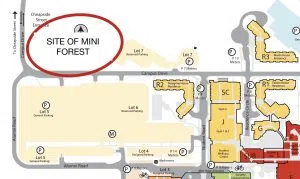
The site of Fanshawe's future Miyawaki forest. (Credit: Jack Sutton)
A first-of-its-kind event is happening at Fanshawe on Sept. 23: students and faculty will be planting a mini Miyawaki forest.
In the 1970s, a Japanese botanist named Akira Miyawaki developed a new method of afforestation. It involves the dense planting of a variety of native trees and plants, in order to simulate a forest’s natural layers.
“We’re looking at putting in three plants per square meter,” says Cindy Buelow, Fanshawe’s Garden Manager. “So, it’s a very dense planting, and that’s to encourage very fast upward growth of these trees.”
The increased growth speed is just one of the benefits of this technique.
“Essentially, you get 10 times faster growth for the trees than you would in a normal forest,” Buelow says. “And you have 100 times more diversity, because we start with that biodiversity, rather than in a natural forest where you kind of get the seedlings from the plants that are directly surrounding that space.”
Miyawaki forests are also able to essentially self-prune.
“So the idea is that the tree struggles, dies, falls down within the garden space, and then provides nutrients for the trees that are left over.”
Buelow says Fanshawe students can expect to see a fairly good vegetated space in the next five years.
In the meantime, students are invited to participate in the planting on Monday and, for anyone interested in taking part, Buelow says the planting conditions are excellent and the trees are very easy to plant.
The site of the new mini forest is on the north side of Campus Drive, across from Parking Lot 5.





